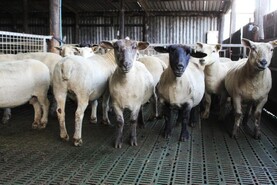A survey conducted by Love Irish Food in October found that companies share one dilemma: the recruitment of staff and retention of well-trained employees.
Of the respondents, 77% said that they were facing an issue with retention, while 83% said that they had trouble recruiting qualified staff.
Respondents to the survey were a mixture of big international companies that are members of Love Irish Food, as well as middle-sized companies and artisan producers.
Pandemic Unemployment
Payment (PUP)
Love Irish Food found that as parts of the labour force are still availing of the PUP, they are not returning to the workplace.
The organisation calculates that with the current unemployment rate (7.9%), and taking the seasonal adjustment into consideration, the PUP is contributing 2.5% to the labour shortage.
Kieran Rumley, executive director at Love Irish Food, says that the combination of input costs (+29%) and the shortage of labour could cause “serious potential damage and disruption in production”.

Kieran Rumley, executive director of Love Irish Food.
Rumley is hopeful that as more people stop availing of the PUP and return to work, the issue of staff recruitment will improve.
Demand is up
Demand for local produce has increased since the start of the pandemic and this is adding to the urgency to fill vacant positions.
Rumley says: “[Producers] have got to drive further efficiencies in their business and they’ve got to keep the retail shops full. That’s the most important thing from a shopper’s viewpoint. One of the things that came out of Brexit was that local food and drink brand producers are in demand as retailers are refocusing on the local supply base to shore up gaps in their offering.”
Consequences
Apart from labour shortages, the agriculture and food sector is facing increased production costs.
Input costs for transport within Ireland are up 12% with export costs up 29%, on average, according to those surveyed.
Rumley cautioned that this is putting a serious strain on a sector still struggling with the effects of the COVID-19 pandemic on their business operations.
“The global pandemic and Brexit have made the issues facing the sector acute, with many now having to consider range rationalisation to offset labour challenges and to decrease costs,” says Rumley.
Read more
Money Mentor: skills and labour shortages in agri-food sector addressed
Agri food labour shortage is long term, MPs told
A survey conducted by Love Irish Food in October found that companies share one dilemma: the recruitment of staff and retention of well-trained employees.
Of the respondents, 77% said that they were facing an issue with retention, while 83% said that they had trouble recruiting qualified staff.
Respondents to the survey were a mixture of big international companies that are members of Love Irish Food, as well as middle-sized companies and artisan producers.
Pandemic Unemployment
Payment (PUP)
Love Irish Food found that as parts of the labour force are still availing of the PUP, they are not returning to the workplace.
The organisation calculates that with the current unemployment rate (7.9%), and taking the seasonal adjustment into consideration, the PUP is contributing 2.5% to the labour shortage.
Kieran Rumley, executive director at Love Irish Food, says that the combination of input costs (+29%) and the shortage of labour could cause “serious potential damage and disruption in production”.

Kieran Rumley, executive director of Love Irish Food.
Rumley is hopeful that as more people stop availing of the PUP and return to work, the issue of staff recruitment will improve.
Demand is up
Demand for local produce has increased since the start of the pandemic and this is adding to the urgency to fill vacant positions.
Rumley says: “[Producers] have got to drive further efficiencies in their business and they’ve got to keep the retail shops full. That’s the most important thing from a shopper’s viewpoint. One of the things that came out of Brexit was that local food and drink brand producers are in demand as retailers are refocusing on the local supply base to shore up gaps in their offering.”
Consequences
Apart from labour shortages, the agriculture and food sector is facing increased production costs.
Input costs for transport within Ireland are up 12% with export costs up 29%, on average, according to those surveyed.
Rumley cautioned that this is putting a serious strain on a sector still struggling with the effects of the COVID-19 pandemic on their business operations.
“The global pandemic and Brexit have made the issues facing the sector acute, with many now having to consider range rationalisation to offset labour challenges and to decrease costs,” says Rumley.
Read more
Money Mentor: skills and labour shortages in agri-food sector addressed
Agri food labour shortage is long term, MPs told







 This is a subscriber-only article
This is a subscriber-only article











SHARING OPTIONS: